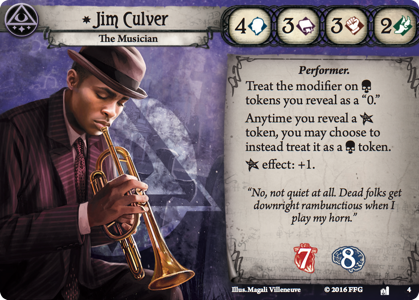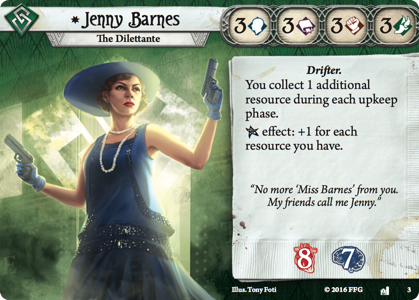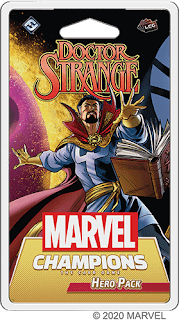This is a light review for the entire Dunwich Legacy Campaign for Arkham Horror:The Card Game, which includes the deluxe box (which begins the cycle with new investigators, two scenarios, and a number of cards across all the attribute sets) as well as all six of the chapter packs. I will do my best to avoid spoilers to the stories, but information about the new cards for the investigators is readily available everywhere online there are deck databases. Mostly, I'll try and indicate how good the story is and whether the scenarios are fun because of the way they are setup. This does not include the followup set Return to the Dunwich Legacy. I'm going to record my impressions as I work my way through the campaign, so it'll be an odd combo of session reports and reviews.
The Dunwich Cycle was released in 2017 and was the first campaign set delivered by Fantasy Flight Games (FFG) for the game. It very recently (early summer 2020) was reprinted by FFG. If you are interested in getting into the game with a full cycle of available stuff, this is a great time and place to start. Because I was able to get the full set all at once, I elected to open all the packs and make all of the investigator cards available from the outset. For the investigator cards, FFG randomly spreads them out throughout the cycle and there is no "logical" order to them and no reason to wait until you get to a particular chapter before using those cards. For a new cycle, you would normally have to wait - I had the luxury of not needing to do so. Because of this, I won't give impressions on the cards each "set" contains - I've already mixed them all together.
I put together decks for a couple of new investigators to give them a try. The new investigators are limited to the standard cards, one area of expertise and five (5) level zero cards from any of the other sets, which gives them a slightly interesting flavor of your choosing.
For this playthrough/review I choose to play with: Jim Culver and Jenny Barnes.
Jim is solidly based on using Mystic cards (purple), so I built him around cards that allow him to investigate and fight using his spells and then things to either ward off the horrors that come from dipping into the mystic world or healing those wounds.
Because a lot of those skills/spells are willpower based, I also leaned a little towards cards that increased his willpower. I wasn't planning that he'd be the fighter, but a couple of his spells let him use his willpower to damage the bad guys, so I'm hoping he can at least hold his own.
Jenny Barnes is a dilettante who is an above average jack-of-all-trades. She is solidly based on Rogue cards (which I really enjoy. She rakes in the resources which lets her gets solid cards into play, including her twin guns.
A lot of the rogue cards let you avoid the fight and some let you get in a parting shot/sneak attack after exhausting the bad guys. She also has a few tricks up her sleeves (wait, she doesn't have sleeves) and she is actually a really good all round investigator. I'm not sure being a jack of all trades is the way to go, but we'll find out.
There are two scenarios to start the campaign and you get to decide on the order they are played, with some variation in setup based on which you do "earlier" in the evening. This is a nice touch for replaying the campaign, because you can immediately add some variability just by switching this up. I started the campaign, promptly got savaged and resigned before anything interesting happened. I then took so long to get back to the game that I couldn't recall anything that happened (which was nothing), so I restarted and had a much longer and more interesting session with the Extra Curricular Activity scenario (which takes place at the famed Miskatonic University). The scenario is interesting, albeit a little straight forward, with a fun little twist towards the end.
The second starter scenario (which could be considered a part II to the first scenario depending on how you look at it or want to count it) - The House Always Wins is a nice change of pace from "the normal run around and test knowledge to gain clues" using a twist that changes up how you get clues. I enjoyed how it worked thematically and it appears to have setup some things down the road of this cycle.
Overall (storywise), the deluxe set seems to be a good starter. The pair of scenarios make for good 1-2 punch combo for setting the stage. The new investigators are interesting as well and altogether have set my interest for the remaining cycle, which is what the setup should do. Lots of new cards to look at and delve into for your deck building fun.
The first scenario pack didn't disappoint (despite some comments I have seen that the story didn't feel like it fit). I don't want to give a whole lot away, but I will say that I like that they included a number of location cards which means replays of this scenario should be valid and new feeling (at least for a second spin). It does use the tried and true - location you want shuffled into the bottom half of the location cards - trick, which means there is a sort of a forced timer where you have to grind through to get to the location (a little like the forest scenario (last scenario) from the base game).
In my playing, I ended up SUPER frustrated by locked doors and barriers (and some bad bag draws), which is just how things go sometimes. I felt very well equipped (deck-wise), but the encounter deck setup is designed to frustrate you and luck was not with me at all this evening - Jenny went down for the count due to a hex.
Minor spoiler! I did enjoy one minor story element where I met an ally and keeping him alive through the night meant not having to add a bad chaos token to the bag for the rest of the campaign. This plot point was not over bearing, just a nice little addition.
The second of the the scenario packs takes place on a train! A train that you are forced to race through to try and reach the engine before bad things happen. As with most of the scenarios so far, there are multiple locations that are randomized for your play through to make the scenario more replayable. Both investigators were defeated (the toils of the investigations are stacking up on me), but I was also one draw from "winning" (Jim Cutler was already pummeled out of the game, but Jenny had a chance).
This scenario felt slightly shorter than the others thus far, though that might have been partly the forced urgency of the scenario. Things have been fun to this point, though the story thread through each scenario has not been particularly strong thus far. Individually the scenarios have been good, just not tied together with anything other than the bits to start each scenario.
I'm at the halfway point of the campaign now, and so far so good. The story has evolved a little slowly, but I've been getting peeks and hints. The individual scenarios haven't been bad. Despite having some fun cards for my team, I certainly don't feel in control or overpowered at all - which is how it should be for a game with this kind of theme. I'm excited for the second half of things to come.

/pic3610420.jpg)








